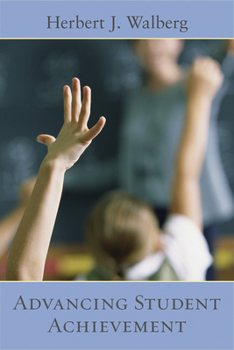Advancing Student Achievement: Volume 568
Select Format
Select Condition 
Book Overview
A renowned educator-psychologist explains how children learn and how family, classroom, and school practices can help them learn more effectively. In addition to drawing on studies of learning... This description may be from another edition of this product.
Format:Paperback
Language:English
ISBN:0817949526
ISBN13:9780817949525
Release Date:March 2010
Publisher:Hoover Institution Press
Length:118 Pages
Weight:0.45 lbs.
Dimensions:0.4" x 5.9" x 8.9"
Customer Reviews
1 rating
Short, and To the Point!
Published by Thriftbooks.com User , 14 years ago
The purpose of this book is to describe how students learn, and to explain how family and school practices can help them learn more. Author Walberg, currently a distinguished fellow at the Hoover Institution and emeritus professor of education and psychology at the University of Illinois at Chicago, contends that relying on rising expenditures has led nowhere - it is time to instead to draw upon careful research instead. Professor Walberg begins with the too-often forgotten sad state of U.S. pupil achievement vs. other nations - U.S. high-school students recently ranked 25th out of thirty countries in science, the hoped-for source of new high-paying jobs in high technology areas to replace those lost to off-shoring. This is not new news - similar findings were reported 30+ years ago. However, then the findings were 'excused' on the grounds that Americans educated a much higher proportion of their teenagers. No longer - between just 1995 and 2005 our high-school completion rates fell from 2nd to 21st among OECD nations, even though U.S. spending/pupil is among the world's highest. Students themselves recognize that substantial improvement is possible, and want to do so. A 1997 survey of teens found 75% said schools should promote only students who master the material, almost two-thirds reported they could do much better if they tried, and nearly 80% said students would learn more if schools made certain they were on time and did their homework. Other surveys find that educators' standards, especially those in colleges of education, are lax compared to those of the public. One obvious problem - time on task. High achieving schools spend about 75% of the time on instruction, while low-achieving schools average only 51%. The difference is taken up by tardiness, disruptions, and off-task activities. Walberg, however, does not believe that schools are the primary determinant of pupil achievement. "In the first eighteen years of life, children spend only about 8 percent of their time in school. Therefore, psychological conditions in the 92% of the time for which parents are chiefly responsible greatly influence what students learn." Walberg suggests specific child-rearing practices to help build a positive approach to learning. Psychologist Walberg also emphasizes the importance of pupil motivation, citing research showing that monetary incentives improved successful Advanced Placement course completion, as well as praise based on effort - from both parents and teachers. Unfortunately, traditional recipes for improving schools, such as paying teachers according to years of experience and number of advanced courses, and reducing class size have repeatedly been found ineffectual in improving pupil outcomes. This finding holds whether evaluated through research findings or assessing historical trends. Classroom practices, not teacher credentials or experience, are what count. Walberg also has no sympathy for those claiming teachers are underpai





